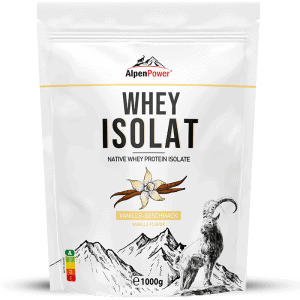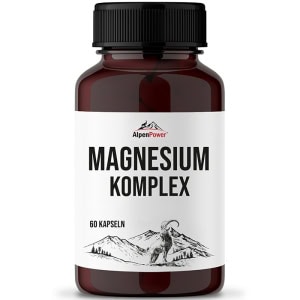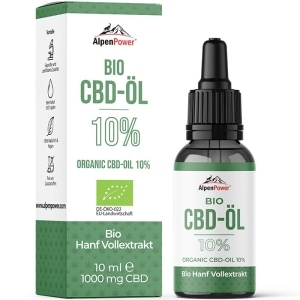An article from Laura Bahmann, sports scientist
The influence of sleep quality on muscular regeneration and athletic performance: An analysis of neurobiological and physiological mechanisms
Sleep is a fundamental part of human physiology and plays a crucial role in athletic performance and muscular regeneration. Athletes who are regularly exposed to high intensities during training are particularly dependent on high-quality sleep in order to regenerate and optimize their physical and psychological resources. Today we will explain to you the connection between the neurobiological and physiological mechanisms regarding sleep quality, muscular regeneration and athletic performance. In this context, AlpenPower’s products, in particular proteins and supplements for sleep optimization, are also presented, which can be a helpful supplement to support regenerative sleep.
Neurobiological basis of sleep
Sleep is divided into different phases, particularly the REM (Rapid Eye Movement) and NREM (Non-Rapid Eye Movement) phases, which have different effects on neuronal activity and the endocrine Systemhave. During the NREM phases, especially in deep sleep, there is a significant activation of the parasympathetic nerves and a reduction in sympathetic activity, what leads to stabilization of the cardiovascular system. In addition, the cellular immune system, particularly the activation of T cells, plays a crucial role during sleep. The production and activation of these immune cells occurs predominantly during deep sleep, indicating that adequate sleep is essential for maintaining immune homeostasis.
A critical aspect is the correlation between chronic lack of sleep and the dysregulation of the hypothalamus-pituitary-adrenal axis, which leads to increased cortisol levels. Chronic sleep deprivation can promote catabolic processes in muscle tissue by negatively affecting protein metabolism and thus hindering muscular regeneration. An increased cortisol level (cortisol = stress hormone) has been proven to lead to reduced performance and slower cell building processes.
Physiological mechanisms of muscular regeneration
Muscular regeneration is significantly influenced by the duration and quality of deep sleep. In this phase, muscle protein synthesis, an anabolized process in which amino acids are used to repair and grow muscle tissue, takes place to a particularly pronounced extent. Lack of sleep can impair the synthesis of muscle enzymes and proteins, resulting in prolonged recovery time.
In addition, sleep has a significant impact on the hormonal control circuit. In particular, the secretion of anabolic hormones such as testosterone and growth hormone is regulated by sleep quality. Studies show that athletes who sleep adequately over a longer period of time have significantly shorter recovery times and improve muscle building progress. This is due to the increased release of hormones during sleep, which supports essential processes of tissue healing and adaptation.
Sleep and athletic performance
The quality of sleep has far-reaching effects on motor and cognitive performance. Good sleep quality not only promotes reaction times, but also cognitive flexibility and executive functions, which directly affects athletic performance. Research shows that athletes who get quality sleep on a regular basis have a reduced risk of injury. This is due to the increased alertness and improved coordination promoted by quality sleep.
In addition, empirical studies show that endurance and strength performance are closely linked to athletes’ sleep patterns. Athletes who are in an optimal sleep environment are able to maintain higher training intensity and increase their maximum performance. Cognitive and motor performance are significantly supported by the neurophysiological processes that take place during sleep.
AlpenPower products to support regeneration
AlpenPower offers a variety of products that specifically support regeneration. Protein shakes play a central role in muscle repair during sleep. Providing essential amino acids during sleep can optimize muscle protein synthesis and significantly shorten regeneration times.
Zusätzlich sind Supplements wie Magnesium Complex und Zink von großer Bedeutung, da diese die Produktion von Melatonin anregen, welches den Schlaf-Wach-Rhythmus reguliert. Dadurch kann die Schlafqualität erheblich verbessert werden. Magnesium weist eine myorelaxierende Wirkung auf, welche die Muskeldisposition fördert. Erfahrungsberichte von Sportlern zeigen, dass die Kombination dieser Produkte signifikante Verbesserungen in der Schlafqualität und somit in der Regeneration bewirken kann. Zudem kann das Bio-CBD Öl ebenso vorteilhaft auswirken. CBD-Öl (Cannabidiol) hat sich in der Forschung als potenziell vorteilhaft für die Schlafqualität erwiesen, wobei mehrere Mechanismen identifiziert wurden. Erstens besitzt CBD anxiolytische Eigenschaften, die die Reduktion von Angst und Stress unterstützen und somit einen entspannteren Geisteszustand fördern. Darüber hinaus moduliert CBD die Schlafarchitektur, insbesondere die REM-Phase, und kann die Gesamtschlafzeit verlängern sowie nächtliche Wachzeiten reduzieren. Seine analgetischen und entzündungshemmenden Effekte tragen zur Schmerzlinderung und zur Minderung chronischer Entzündungen bei, die häufig mit Schlafstörungen assoziiert sind. Zudem interagiert CBD mit dem Endocannabinoid-System, das eine entscheidende Rolle bei der Regulierung von Schlaf, Stimmung und Stress spielt. Zusammengefasst zeigen empirische Befunde, dass CBD-Öl die subjektive Schlafqualität signifikant verbessern kann, indem es die Einschlafzeit verkürzt und die allgemeine Schlafzufriedenheit steigert.
AlpenPower products to support regeneration
To optimize recovery through sleep, athletes should follow some basic sleep hygiene principles. This includes establishing regular sleep times, a relaxing evening routine and minimizing screen time before bed. Combining sleep hygiene with taking supplements, such as AlpenPower products, can further improve sleep quality and thus have a positive impact on athletic performance.
In the long term, improved sleep quality not only influences muscle building, but also general athletic endurance and performance. The implementation of structured sleep strategies and the use of targeted nutritional supplements can be crucial for sporting success and improved regeneration.
Conclusion
In summary, both neurobiological and physiological findings support the central role of sleep in muscular regeneration and athletic performance. High-quality nutritional supplements such as AlpenPower products can help improve sleep quality and promote regeneration. Future research and studies in sports science will continue to provide new insights into the influence of sleep on athletic performance, providing valuable information for athletes and coaches.
Sources
Magnesium und Recovery: https://pubmed.ncbi.nlm.nih.gov/33009349/
CBD: https://pmc.ncbi.nlm.nih.gov/articles/PMC8369499/
Schlafphasen: https://www.healthline.com/health/healthy-sleep/stages-of-sleep
Protein and Sleep: https://pubmed.ncbi.nlm.nih.gov/36083207/
Neurologische Grundlagen: https://pmc.ncbi.nlm.nih.gov/articles/PMC6230548/
Sleep and Athletic Performance: https://pmc.ncbi.nlm.nih.gov/articles/PMC9960533/
Sleep and strength: https://pubmed.ncbi.nlm.nih.gov/29422383/











